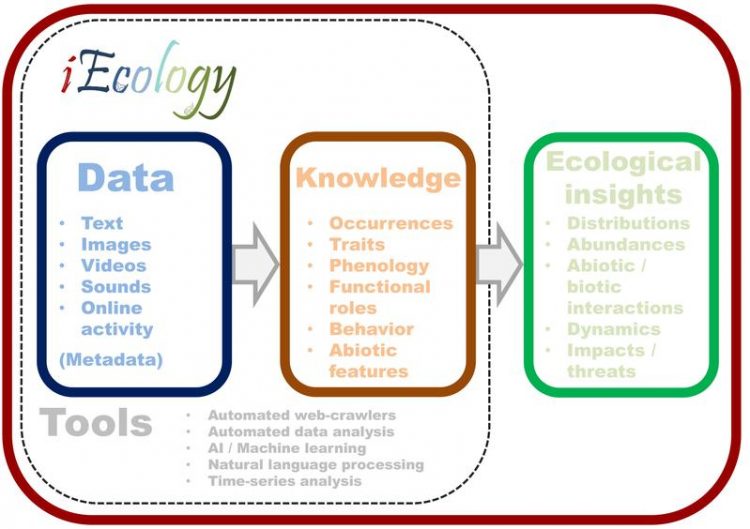New research field iEcology: What the online world can teach us about the natural world

iEcology: Using data from the online world to gain new insights for environmental research. Trends in Ecology & Evolution
Even though we often assume that our online enthusiasm alienates us from nature, the huge and ever-increasing amount of data on the Internet conceals a lot of knowledge about our living environment. All you have to do is lift the treasure:
“In fact, this is not information that has been deliberately collected, but a welcome by-product of our constant need to google, twitter, blog, record our lives and basically stay in contact,” explains Dr. Gregor Kalinkat.
Gregor Kalinkat was involved in the study under the leadership of Ivan Jarić from the Biology Centre of the Czech Academy of Sciences and Uri Roll from the Ben-Gurion University of the Negev in Israel. At the IGB, he is researching biodiversity in inland waters and sees many potential applications for iEcology: for example for biodiversity research and species protection or climate impact research.
Video series of cycling event provides information on climate change:
The following examples from the current overview study demonstrate this assessment: An analysis of video images of the Tour-De-Flanders from the past 35 years enabled highlighting changes in leafing and blooming periods of the trees found in the background of the images, caused by climate change.
Another study analyzed online photos (posted by internet users) of oxpecker birds and various herbivores they sit on, and this illuminated the interactions between these species groups.
Another study shows: Exploring seasonal dynamics of when people search for particular species in Wikipedia can highlight true seasonal dynamics of species.
Dr. Ivan Jarić, the lead author of the new study, is very enthusiastic about the potential of iEcology: “We can now learn so much about where species reside, when they are active in different manners, and how they interact with each other and their environment. We do not see iEcology as a replacement to classical and highly important field ecology – rather as being complementary to it. There are huge amounts of data constantly accumulating with vast and varied potential, just waiting to be used.”
Gregor Kalinkat agrees: ” iEcology can be used for cross-validation; this means that different novel methods are used to test each other. For example, the emergence of new invasive species could be monitored in parallel with image evaluation and DNA analysis.
One of iEcology's challenges is to effectively find the relevant data sources. After all, the needles in the haystack have to be found. There are no search algorithms for this – flair and diligence are required. “Opening up a new field of research is an exciting challenge. In a few years it will be quite normal in ecological research to use data from the Internet for scientific purposes,” concludes Ivan Jarić.
About the Leibniz-Institute of Freshwater Ecology and Inland Fisheries (IGB):
“Research for the future of our freshwaters” is the mission of the Leibniz-Institute of Freshwater Ecology and Inland Fisheries (IGB). IGB is Germany’s largest and one of the leading international research centres for freshwaters. It combines basic and preventive research, trains young scientists and advises decision-makers and society for a sustainable freshwater management. Its key research activities include the long-term development of lakes, rivers and wetlands and the effects of climate change, the renaturation of ecosystems, the conservation of aquatic biodiversity, and technologies for sustainable aquaculture. Work is conducted in close cooperation with universities and research institutions from the Berlin-Brandenburg region as well as worldwide. IGB is a member of the Forschungsverbund Berlin e. V., an association of eight research institutes of natural sciences, life sciences and environmental sciences in Berlin. The institutes are members of the Leibniz Association. https://www.igb-berlin.de/en
Media information at a glance: https://www.igb-berlin.de/en/newsroom
Subscribe to IGB’s newsletter: https://www.igb-berlin.de/en/newsletter
IGB on Twitter: https://twitter.com/LeibnizIGB
IGB on Facebook: https://www.facebook.com/IGB.Berlin/
Dr. Gregor Kalinkat
Department Ecohydrology
Leibniz-Institute of Freshwater Ecology and Inland Fisheries (IGB)
Email: kalinkat(at)igb-berlin.de
Mobile: +49 (0)157 87021304
Ivan Jarić, Ricardo A. Correia, Barry W. Brook, Jessie C. Buettel, Franck Courchamp, Enrico Di Minin, Josh A. Firth, Kevin J. Gaston, Paul Jepson, Gregor Kalinkat, Richard Ladle, Andrea Soriano-Redondo, Allan T. Souza, Uri Roll. iEcology: Harnessing Large Online Resources to Generate Ecological Insights. Trends in Ecology & Evolution, 2020.
https://doi.org/10.1016/j.tree.2020.03.003.
http://www.i-ecology.org/
https://www.igb-berlin.de/en/news/new-research-field-iecology
Media Contact
All latest news from the category: Ecology, The Environment and Conservation
This complex theme deals primarily with interactions between organisms and the environmental factors that impact them, but to a greater extent between individual inanimate environmental factors.
innovations-report offers informative reports and articles on topics such as climate protection, landscape conservation, ecological systems, wildlife and nature parks and ecosystem efficiency and balance.
Newest articles

A blueprint for mapping melting ice sheets
Researchers in the Stanford Radio Glaciology lab use radio waves to understand rapidly changing ice sheets and their contributions to global sea-level rise. This technique has revealed groundwater beneath Greenland,…

Water hyacinth plant pots – utilization of an invasive species
Together with Fiber Engineering GmbH, the DITF presents a process for the production of biodegradable plant pots. The products are cost effective and competitive. At the same time, the production…

Current research on the new 6G mobile communications standard
Nursing care robots, autonomous driving, digital twins: all of these high-tech applications will play an essential role for the new 6G mobile communications standard. The first commercial 6G networks are…



